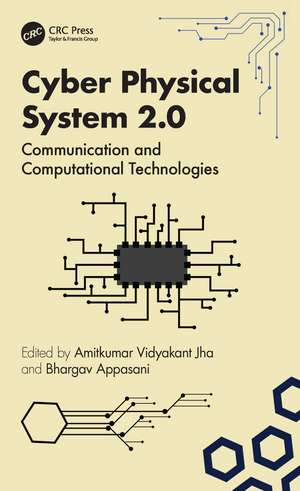Cyber Physical System 2.0: Communication and Computational Technologies
Editat de Amitkumar Vidyakant Jha, Bhargav Appasanien Limba Engleză Hardback – 16 dec 2024
This book:
- Discusses how communication and computing co-design provides dynamic adaptability and centralized control.
- Presents the convergence of physical and digital realities within the Metaverse and Multiverse, setting the stage for the future of Cyber-Physical-Social Systems (CPSS)
- Presents emerging communication and computational technologies such as 6G, software defined networking, cloud computing, blockchain, artificial intelligence, machine learning, virtual reality, and blockchain for the design and implementation of cyber-physical systems.
- Explores advanced topics such as security and privacy in industrial CPS, strategies for protecting serial industrial networks, and enhancing firmware update security in automotive systems.
Preț: 1167.38 lei
Preț vechi: 1459.23 lei
-20% Nou
Puncte Express: 1751
Preț estimativ în valută:
223.40€ • 232.94$ • 185.67£
223.40€ • 232.94$ • 185.67£
Carte tipărită la comandă
Livrare economică 20 martie-03 aprilie
Preluare comenzi: 021 569.72.76
Specificații
ISBN-13: 9781032614632
ISBN-10: 1032614633
Pagini: 356
Ilustrații: 178
Dimensiuni: 156 x 234 mm
Greutate: 0.68 kg
Ediția:1
Editura: CRC Press
Colecția CRC Press
Locul publicării:Boca Raton, United States
ISBN-10: 1032614633
Pagini: 356
Ilustrații: 178
Dimensiuni: 156 x 234 mm
Greutate: 0.68 kg
Ediția:1
Editura: CRC Press
Colecția CRC Press
Locul publicării:Boca Raton, United States
Public țintă
Academic, Postgraduate, and Undergraduate AdvancedCuprins
1. Introduction to Cyber Physical Systems 2.0: Evolution, Technologies, and Challenges. 2. Communication and Computing Co-design under Imperfect Channel Conditions for Control and Scheduling in CPS 2.0. 3. Software-Defined Networking in Cyber-Physical Systems: Benefits, Challenges, and Opportunities. 4. Toward Future Metasystems: From Today’s CPS to Tomorrow’s Cyber-Physical-Social Systems in the Emerging Metaverse. 5. Healthcare Cyber-Physical System for Smart Cities: Implementation, Challenges and Solution. 6. Enabling Smart Manufacturing Through Cloud Computing and Cyber-Physical Systems. 7. An open architecture for Cyber-physical systems 2.0 from a holonic perspective for application in sustainable manufacturing. 8. AI model generation methodology and software architecture for CPS 2.0 manufacturing systems. 9. Cyber-Physical System Formulations for Health Monitoring-Informed Bridge Infrastructure Assets. 10. Security and Privacy in Industrial Cyber-Physical Systems: Concerns, Challenges, and Countermeasures. 11. Strategies for Protecting Serial (Non-IP) Industrial Networks in Cyber-Physical Systems 2.0. 12. Enhancing the Security of Firmware Over-the-Air Updates in Automotive Cyber-Physical System. 13. Advanced Computational Techniques for Improving Resilience of Critical Energy Infrastructure under Cyber-Physical Attacks.
Notă biografică
Amitkumar V. Jha received his MTech degree from the Indian Institute of Industrial Technology, Guwahati, India, and his PhD degree from the Kalinga Institute of Industrial Technology (KIIT), Bhubaneswar, India. He has working as an assistant professor at KIIT since 2015. He has authored more than 50 articles in international journals and conference proceedings. He has also authored four book chapters. He has edited a book titled Metamaterials for Microwave and Terahertz Applications: Absorbers, Sensors and Filters, which is available at DOI. 10.52305/APHY8244. His research interests include smart grid, communication network, optimization, etc. He is a reviewer of several journals, such as e‑Prime, IEEE Access, IEEE System Journal, IEEE IoT, Wireless Personal Communication, International Journal of Electrical Power and Energy Systems, Energies, Mathematics, etc., and he is the editor of the Journal of Computer Networks and Communications. He is also a member of many professional organizations, such as the Indian Science Congress, the International Association of Engineers, the World Leadership Academy, etc.
Bhargav Appasani received his PhD (Engg.) degree from Birla Institute of Technology, Mesra, India. He is currently an associate professor with the School of Electronics Engineering, KIIT University, Bhubaneswar, India. He has published more than 140 articles in international journals and conference proceedings. He has also published six book chapters with reputed international publishers. He has also authored a book with a publication of international repute and is currently editing two more books. He also has a patent filed to his credit. He is an academic editor of the Journal of Electrical and Computer Engineering (Hindawi) and a reviewer for IEEE Transactions on Smart Grid, IEEE Transactions on Antennas and Propagation, and IEEE Access. Dr. Appasani has taught many courses, such as machine learning, data structure algorithm, microwave, control system, etc., for several years. His research interests include optimization, AI, metamaterials, communication systems, etc.
Bhargav Appasani received his PhD (Engg.) degree from Birla Institute of Technology, Mesra, India. He is currently an associate professor with the School of Electronics Engineering, KIIT University, Bhubaneswar, India. He has published more than 140 articles in international journals and conference proceedings. He has also published six book chapters with reputed international publishers. He has also authored a book with a publication of international repute and is currently editing two more books. He also has a patent filed to his credit. He is an academic editor of the Journal of Electrical and Computer Engineering (Hindawi) and a reviewer for IEEE Transactions on Smart Grid, IEEE Transactions on Antennas and Propagation, and IEEE Access. Dr. Appasani has taught many courses, such as machine learning, data structure algorithm, microwave, control system, etc., for several years. His research interests include optimization, AI, metamaterials, communication systems, etc.
Descriere
The book covers the emerging communication and computational technologies for future cyber-physical systems, discusses the security of in-vehicle communication protocols using automotive embedded systems, presenting an in-depth analysis across various domains such as manufacturing, transportation, healthcare, and smart cities.
